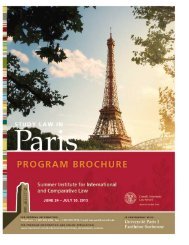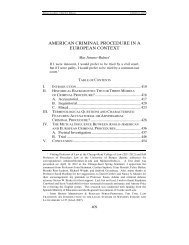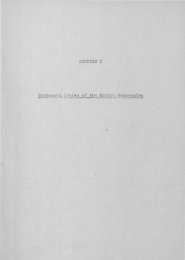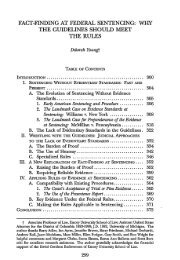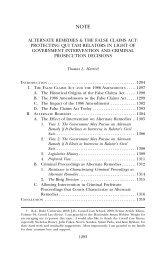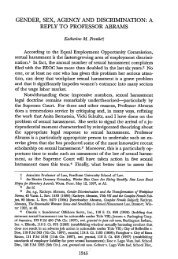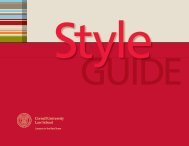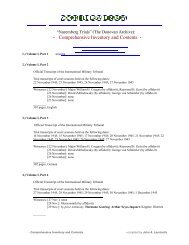JUDICIAL CLERKSHIP HANDBOOK - Cornell University Law School
JUDICIAL CLERKSHIP HANDBOOK - Cornell University Law School
JUDICIAL CLERKSHIP HANDBOOK - Cornell University Law School
You also want an ePaper? Increase the reach of your titles
YUMPU automatically turns print PDFs into web optimized ePapers that Google loves.
since your preferred judges may not get back to you as quickly as some others.<br />
There is no formula for success here, and the process, once set in motion, is largely beyond<br />
your ability to control. Under these circumstances, you are well‐advised to send<br />
applications only to those judges from whom you would feel comfortable accepting an<br />
offer. However unsettling or unusual this process may seem, remember that a clerkship is<br />
not like most other legal jobs. It is a unique, one‐ or two‐year long experience during which<br />
you will, no matter where or for whom you clerk, learn much about the practice of law<br />
while often developing an enduring personal and professional relationship with someone<br />
who has lived a life in the law.<br />
EXPECTATIONS ABOUT ACCEPTANCE – STATE <strong>CLERKSHIP</strong>S<br />
State court judges, are first and foremost, judges. Like their federal colleagues, they too are<br />
accustomed to deference. So, when a state court judge makes a clerkship offer, s/he would<br />
like it accepted as soon as possible. If you receive an offer from a state court judge and feel<br />
comfortable accepting it on the spot, by all means, do so. However, if you need a bit of<br />
time, perhaps a week, to think it over, you may, graciously and humbly, ask for that small<br />
amount of time to weigh your decision. Once that time has expired, promptly contact the<br />
judge and tell him/her of your decision. While state court judges may be slightly more<br />
flexible about acceptances, remember that the judge’s perceptions of you (and your law<br />
school) will be formed, in part, based on these initial interactions.<br />
CLERKING AND COURSE SELECTION<br />
There are no Arequired@ courses for clerking but it is a good idea to keep your clerkship<br />
plans in mind as you put together your second and third year curriculum. Moreover, some<br />
judges will like to know that you have taken, or intend to take, certain courses that will<br />
come in especially handy given the nature of their docket. Look for opportunities to<br />
improve your legal writing.<br />
For a federal court clerkship, it is important that you take Federal Courts which, among<br />
other things, will acquaint you with special issues involving the Article III judicial power and<br />
the most important federal causes of action. If criminal cases or civil rights cases form a<br />
significant part of your court=s docket (as they do for the federal courts and many state<br />
appellate courts), Criminal Procedure can be very useful. Other courses you might find<br />
helpful include advanced procedure offerings (e.g., Advanced Civil Procedure; Injunctions)<br />
and Administrative <strong>Law</strong>. If you are interested in a Aspecialty court@ (a court that handles<br />
exclusively tax, bankruptcy, domestic relations, etc.) you should obviously plan on taking<br />
the available courses relevant to that specialty. Finally, once you have secured a clerkship,<br />
you should ask your judge if there are any particular courses he or she would like you to<br />
take.<br />
24 | P age



